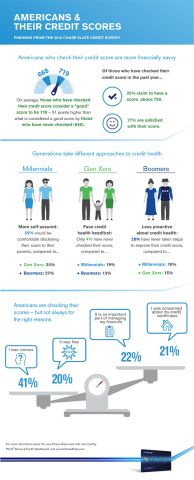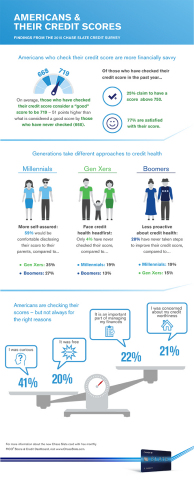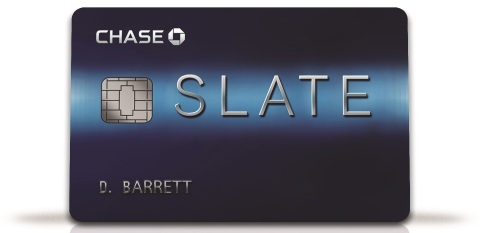WILMINGTON, Del.--(BUSINESS WIRE)--The vast majority of Americans (90 percent) recognize the importance that access to credit plays throughout their life, according to the new Chase Slate Credit Survey. However, when it comes to awareness of their personal credit health there are gaps. Nearly four-in-ten Americans (39 percent) admit they do not know their current credit score, and more than half (52 percent) do not know that paying bills on time is the factor that has the largest impact on their credit score.
The survey reveals that Americans who have previously checked their credit score consider a “good” score to be 719 on average1. This is 51 points higher than what is considered to be good by those who have never checked their score (668). What Americans may not realize is that even a score of 719 might not give them access to credit at the best rates.
“Having healthy credit could mean the difference between achieving major life goals, such as buying a home or starting a small business, and never realizing those dreams. Yet too many Americans don’t have access to information and tools that empower them to properly plan for the future and manage their credit health,” said Pam Codispoti, President of the Mass Affluent Business for Chase Card Services.
Only 37 percent of Americans feel very confident that their current credit score can help them accomplish certain personal goals in their life, and many wish their credit score were higher. Two-thirds (66 percent) say they would like to be able to improve their credit score over the next year, yet only one-in-three (35 percent) have a plan they feel confident will allow them to succeed and one-fifth (22 percent) admit they have never taken any steps to do so.
Chase recently introduced the new Slate Credit Card, which provides cardmembers with a Credit Score & More feature. Cardmembers have access to their FICO® Score for free as well as the reasons behind their score, a summary view of their credit bureau information and helpful suggestions to manage their credit health. With Slate, cardmembers have the information and insights to understand where they stand so that they can move forward with confidence. The feature is available to Slate cardmembers online at Chase.com.
“Chase is committed to providing our cardmembers with insights and relevant, reliable tools that give them a financial edge,” said Codispoti. “The new Chase Slate credit card offers them their FICO Score as well as the ability to explore key details from their credit bureau report and drill down on each attribute for context, education and an indication of where they stand. It’s a comprehensive picture of their credit health, and one we believe will be valuable and empowering along their financial journeys.”
Americans are checking their scores – but not always for the right reasons
While a majority of Americans say they check their score – with as high as 59 percent having checked in the last year – only two-in-ten Americans (22 percent) say they check their score because it is an important part of managing their finances.
“Your credit score is much more than just a number – it’s a key indicator of credit health that helps you assess where you stand and what’s within reach,” says personal finance expert and Chase Slate financial education partner Farnoosh Torabi. “Checking your score, and checking it regularly, is a simple step you can take now to introduce more positive financial habits into your life. The higher your score, the more likely you are to be deemed eligible for a loan or receive better terms and interest rates.”
Of those who have never checked their credit score, 44 percent say it’s because they did not have a reason to, while one-in-four (27 percent) say they do not have enough time and energy or it’s too much effort to obtain their score.
Generation Xers face credit health headfirst
The Chase Slate Credit Survey suggests Gen Xers are bolder about facing their credit health than other age groups. Just four percent of Gen Xers say they have never checked their score, compared to roughly one-in-five Millennials (19 percent) and 13 percent of Boomers. Further, a majority of Gen Xers (67 percent) claim they know their score, trailed by 60 percent of Boomers and 55 percent of Millennials. The survey hints that hindsight has something to do with it – more than three-in-five Gen Xers (62 percent) claim they would have benefitted from knowing their credit score at some point in their lives.
Although Boomers consider a good score on average to be 726 – higher than Gen Xers (712) and Millennials (695) – they are seemingly less proactive about credit health than their generational counterparts. More than one-in-four Boomers (28 percent) admits they have never taken steps to improve their credit score, compared to 19 percent of Millennials. Yet Millennials appear to be more self-assured than their older counterparts, as nearly three-in-five Millennials (59 percent) say they would be comfortable disclosing their credit score to their parents, compared to only 35 percent of Gen Xers.
Americans tend to keep credit health close to the vest
According to survey findings, Americans are more comfortable disclosing their age (70 percent) and their weight (12 percent) than their credit score (11 percent) or their income (7 percent). Almost half (44 percent) indicate they would not be okay disclosing their credit score to their partner, and even more wouldn’t be comfortable sharing with their parents (62 percent), their siblings (72 percent) or their best friend (75 percent). One quarter of Americans (26 percent) say they would not be comfortable sharing their credit score with anyone.
Hispanics distinguish themselves as more forthcoming with their scores and report being more comfortable than Americans overall with disclosing their credit score to their partner (63 percent versus 56 percent, respectively), their parents (49 percent versus 38 percent, respectively) and their siblings (35 percent versus 28 percent, respectively). Comparatively, only 16 percent of Hispanics say they would not share their credit score with anyone.
The survey also reveals that more than one-third (37 percent) of Americans who are married or have a partner do not know their significant other’s credit score. However, only 16 percent say it would have been beneficial to know their significant other’s credit score before getting married. Millennials who are married are more likely to know their spouse’s score (74 percent) than married Gen Xers (61 percent) and Boomers (59 percent).
About the 2015 Chase Slate Credit Survey
The 2015 Chase Slate Credit Survey was commissioned on behalf of Chase Card Services to measure Americans’ understanding, attitudes and perceptions around credit and credit health. The survey was conducted via an online survey by Stratalys Research, an independent research company. Interviews were conducted from February 27 – March 11, 2015 among a nationally representative sample of 1,000 respondents age 18 and older. The credibility interval for a sample size of 1,000 is +/- 3.6% and larger for subgroups.
About Chase
Chase is the U.S. consumer and commercial banking business of JPMorgan Chase & Co. (NYSE: JPM), a leading global financial services firm with assets of $2.6 trillion and operations worldwide. Chase serves nearly half of America’s households with a broad range of financial services, including personal banking, small business lending, mortgages, credit cards, auto financing and investment advice. Customers can choose how and where they want to bank: More than 5,500 branches, 18,000 ATMs, mobile, online and by phone. For more information, go to Chase.com. For more information about Chase Slate, go to ChaseSlate.com.
1 National average credit scores from the Chase Slate Credit Survey are based on the mean average of responses within the 300-900 range.





